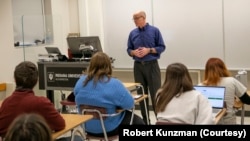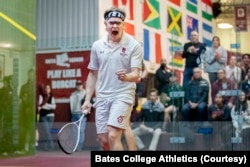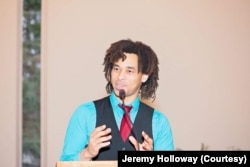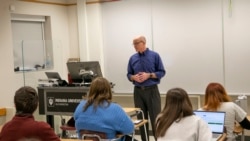When students think about college classes in the United States, they often think about the ones that will result in a degree. A science student might take a number of biology and chemistry classes.
However, most American universities permit students to take several classes outside of their study program, or major.
In fact, most universities require students to take classes outside of their major in order to gain general knowledge. At Brandeis University near Boston, students who study for a degree in biology must take a number of “core” classes. In addition, students also take classes called “electives” that do not fall into either their core studies or their major.
Some of these classes cover unusual subjects.
At the University of Texas, you can take a class called “The Taylor Swift Songbook.” At Amherst College in Massachusetts, there is a class called “Rap, Reagan and the 1980s.”
VOA Learning English spoke with one international student and two professors about electives.
The Norwegian squash player
When Jesper Phillips of Norway arrived at Bates College in Maine, he took a class for first-year students called “The Local Politics of a Global Game.” It was about soccer.
Phillips wanted to go to a school with good science classes. He also wanted to keep playing squash, an indoor racquet sport. So, he chose to attend Bates. He finished school in 2022 with degrees in both physics and math. He also was the top player on the school’s squash team. He now works as a data scientist for Microsoft.
He enjoyed school at Bates because the classes were very small. The largest had about 20 students and one special physics class had only four.
The politics of soccer class was part of the college’s First Year Seminar program. Other classes that year included: “Reading Cats and Dogs,” about animals in famous writing, and “Contemporary Comedy” a class that studied humor in writing, podcasting and in movies or television.
“All the options are going to be unrelated to (your major),” Philips said when discussing the classes.
Phillips said he had to explain the reason for the class to family and friends at home.
“I got a few comments about really spending my time well in the U.S. and really getting value for it. There was definitely some question marks, but I kind of explained the purpose of it and they were a bit more open to the idea.”
Phillips said that the class is supposed to help students learn what college expects of them. They had writing projects and a lot of discussions. They learned about a syllabus, or class plan, and how to cite their sources when writing.
He thinks about the class every four years during the World Cup. Phillips also made friends he still talks with five years later.
Teaching future doctors how to talk with elderly people
At the University of North Dakota’s medical school, in Fargo, students studying to be doctors can take Jeremy Holloway’s class called “Legacy Building with Older Adults.”
Holloway’s class helps medical students make connections with elderly people by setting up in-person conversations or video calls. Holloway said he hopes the students learn how to “see older adults as human beings…and not as a different species.”
The point of the class is not the same as others at a medical school. In those classes, students might learn about the human body or how to treat disease. In his class, Holloway said he wants to help young students learn to see people first and not think of them as their job positions or titles, such as doctor, nurse or professor.
“I’ve always said the title that’s more important to me is Jeremy, because that's what my mom, my dad gave me that. It’ll be the most important title that I'll have until I die.”
Holloway said international students in his class learn something from older adults, and adults learn from the international students. First, many of the older adults have never met someone from another country. Second, when the students make friends with an older American, he said, “It really helps them to learn the culture of the United States.”
Discussing risk and failure
At Indiana University, Robert Kunzman teaches about learning from failure. The class is called “Failure: How We Can Learn from It.”
Kunzman said it is important for students to think about “questions and topics that they might not have planned for.” He said taking a class outside of their main study program is a good way to “broaden their horizons and ways of thinking about the world.”
The course tells students how people in many different professions learn from failure. In medicine, a patient might die from cancer. In business, a company might lose money and close. In both cases, Kunzman said, “we learn more when we fail (because) we’re forced to consider what we need to do differently in the future.”
Kunzman said he gets students from “all across campus” in his class. Their fields include business, science, engineering, journalism and public policy.
“They learn a lot more,” he said, “than just sitting in class with students from their own majors.”
He said one of the most important lessons for students to learn is that it is all right to take calculated risks.
“I think that what’s important is to develop a capacity to make good judgments, to make good decisions, about the chances that we take, and to develop strategies that allow us to learn from the times when we fail, when things don’t work out.”
The end goal of electives
Kunzman agrees with Holloway, who said, “There’s a need for these kinds of experiences.” They believe students cannot get a full education by only taking the courses that are required for their major.
Sometimes, Kunzman said, it is hard for students to understand it might be good to make time for an elective. After all, many feel pressure to finish school and start working.
But, he noted, the educational experience can be “supplemented and supported by courses that allow the student to (think about) questions that are important to having a meaningful career and a long-term impact on their society and themselves.”
I’m Dan Friedell. And I’m Faith Pirlo.
Dan Friedell wrote this story for Learning English.
_________________________________________________________________
Words in This Story
core –n. the most basic, important part of something
degree –n. an official document that someone receives after completing a series of classes at a college or university
a bit –phrase a little or small amount of something
cite –v. to present the words from a book especially as support for an idea
species –n. a group of similar plants or animals
topic –n. a subject of something, an issue for discussion
horizons –n. (pl.) the limits of a person’s knowledge or experience
campus –n. the grounds of a college or university
calculate –v. to consider something to make a judgement about whether it is worth doing or attempting
impact –n. a useful or important influence
______________________________________________________________________
We want to hear from you. Do you want to take an elective class if you come to study in the U.S.?
We have a new comment system. Here is how it works:
- Write your comment in the box.
- Under the box, you can see four images for social media accounts. They are for Disqus, Facebook, Twitter and Google.
- Click on one image and a box appears. Enter the login for your social media account. Or you may create one on the Disqus system. It is the blue circle with “D” on it. It is free.
Each time you return to comment on the Learning English site, you can use your account and see your comments and replies to them. Our comment policy is here.









Forum